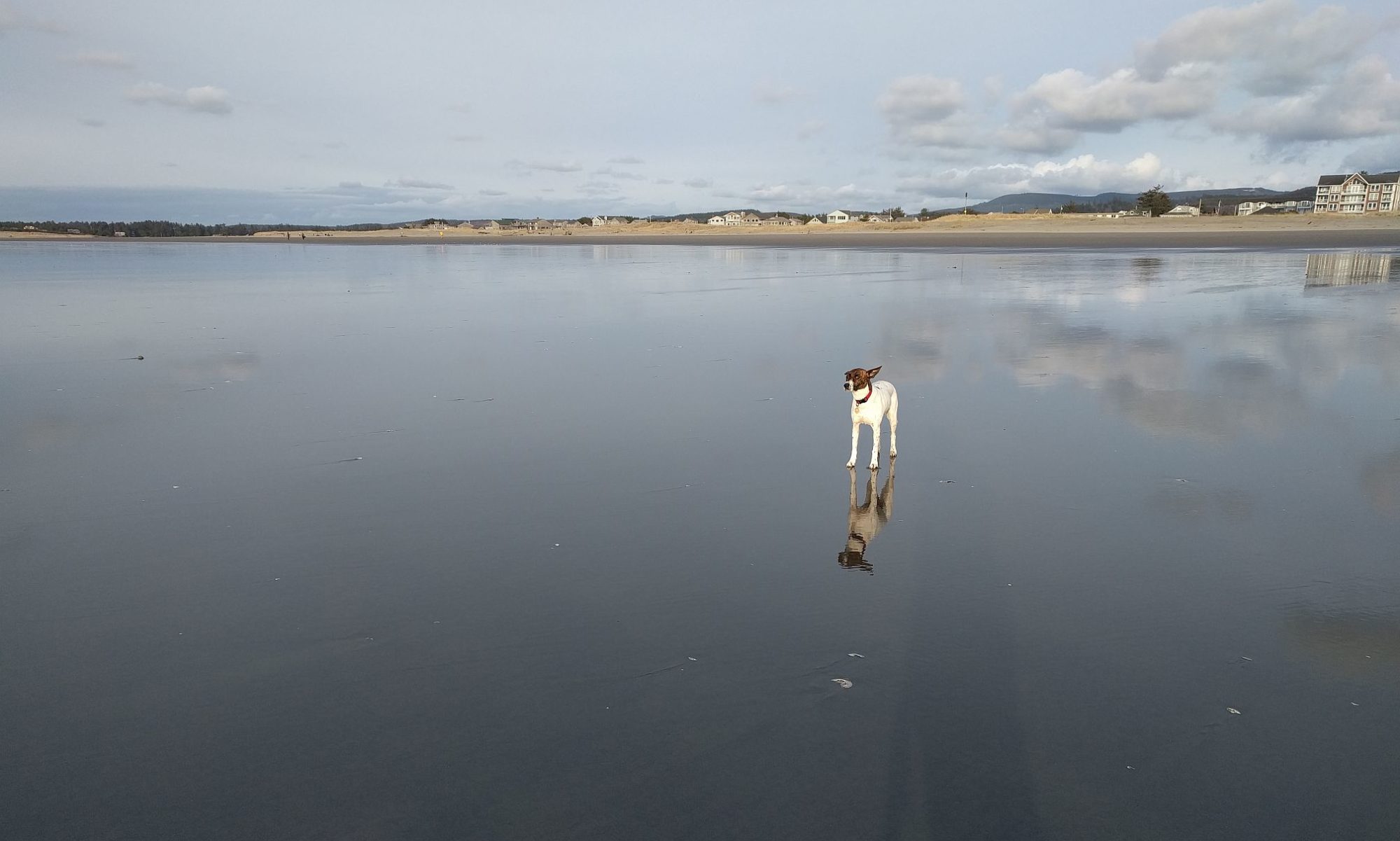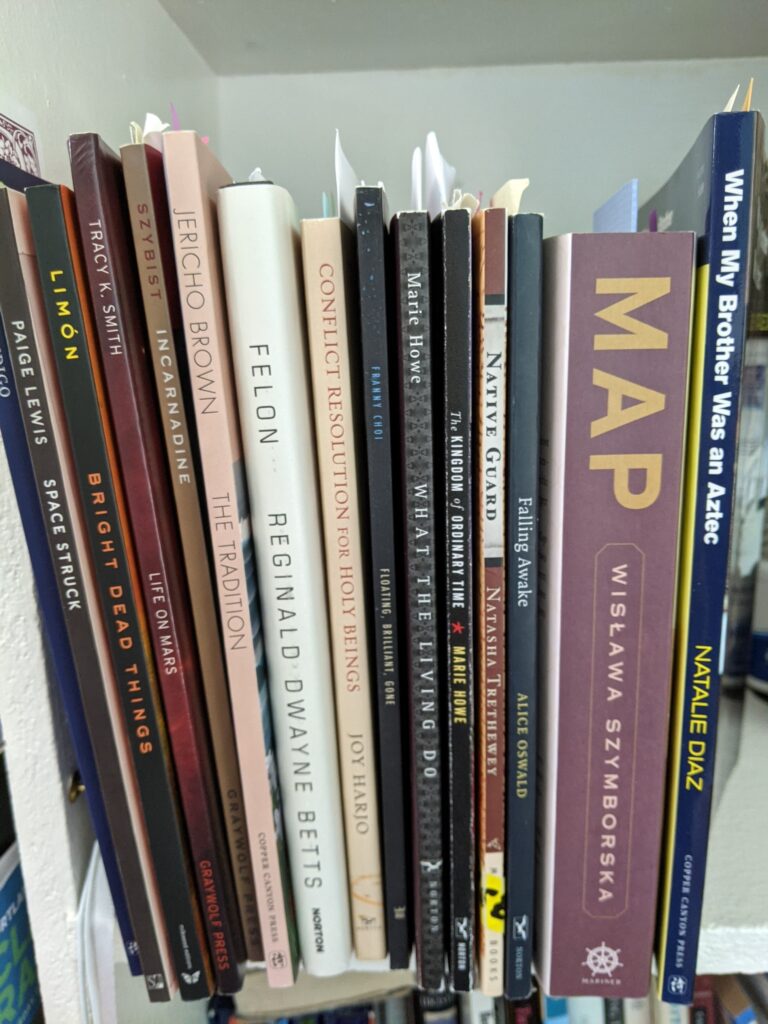Long before lockdown and a raging pandemic, I wanted to invite a Poetry Reading Circle. So seldom did I finish an entire collection. With others, I’d be motivated! It seemed a fun way to gather with people I like.
One morning last April, I sent the invite. A bit disappointed at first because my “local” friends offered scant reply, I reached out to three old friends on the East Coast: Within 15 minutes, two of them replied enthusiastically.
Yippee! We were set to begin! Four wild reading women felt like plenty for our virtual gathering!
We first read Indigo by Ellen Bass. Julie, my co-conspirator in Portland, chose our second month’s read: Paige Lewis’ debut, Space Struck. As months passed, other women joined us. Some stayed, others were swept away by life’s obligations.
By May of 2021, a year later and most of us vaccinated, one of the East Coast originals—Stacey—suggested we pause for a Retrospective.
“I would never have read any of these books without our group,” Jamie, living in the D.C. area, said at our July meeting.
ALL of us agreed we would never have read ALL of these books without each other.
Our group is a collection of poets, writers, biologist, bodyworkers, IT-experts, mothers, aunts—a mix of incredible hearts and minds! We wanted to dive into a single poet’s creation, her (or his) collection, one at a time. What might we learn?
Month-by-month, we took turns choosing. We took turns leading which meant sending out questions, reviews, articles we found inspiring—nudging each other along.
Together we have brought poetry closer to where it’s meant to be!
Up close, we’ve witnessed how a poem can change a life: A poem can help us to feel less alone. A single poem can help us to understand ourselves better, to feel what we already feel more deeply in the cradle of the human family—AND to grow more empathy, attunement in the world—by reading works by poets who live an experience unlike our own.
As several of our poets have reminded us: Animals all are we! And yet, no other reads and writes poetry as the human being can.
During our Retrospective, July meeting, Stacey shared the story of sending the poem “I Said” by Jane Hirshfield, to several friends who had recently lost their mother. Each had been a part of preparing their mother’s body for cremation, and each had accompanied the body to the crematorium in New York City.
The sharing of this poem with her friends generated moving conversation. One wrote back saying she is not someone who reads poetry, “but I’m amazed by what this poet captures in only 20 words!”
Here’s Hirshfield’s poem:
I SAID
I said I believed
a world without you unimaginable.
Now cutting its flowers to go with you into the fire.
Each poet offers intimate expression and experiences from their own lives, from their own ways of creating, thinking, seeing, and feeling the world.
As is, about one in ten American adults read poetry.
More than once, I’ve given someone I love a book of poetry I thought they would enjoy only to feel their resistance—as if I had been pushing a drug.
Oprah Winfrey, Bill Gates, and other celebrities helped popularize books groups, but few reading groups focus on poetry. Surely not all of you will enjoy membership in a group like ours, but I invite–especially if you already belong to a Book Group:
For a month, CHOOSE POETRY!
To aid you in the pickings, try a winner of the Pulitzer Prize (Natalie Diaz in 2021); a poet chosen for the Nobel Prize in Literature (Louise Gluck 2021, Wislawa Symborska 1996); a National Book Award winner (Mary Szybist 2013); the current poet laureate (Joy Harjo); or winner of the Griffin Award in Great Britain (Alice Oswald 2019).
Poetry Pal's Book List So Far 1. Ellen Bass – Indigo 2. Paige Lewis – Space Struck 3. Ada Limón – Bright Dead Things 4. Mary Szybist –Incarnadine 5. Jericho Brown – The Tradition 6. Tracy K. Smith – Life on Mars 7. Franny Choi – Floating, Brilliant, Gone 8. Reginold Dwayne Betts – Felon 9. Alison C. Rollins – Library of Small Catastrophes 10.Joy Harjo – Conflict Resolution for Holy Beings 11.Marie Howe – What the Living Do 12.Natasha Trethewey -- Native Guard 13.Jane Hirshfield -- Ledger 14.Alice Oswald – Falling Awake 15.Wislawa Szymborska – View with a Grain of Sand: Collected Works Next up: 16.Natalie Diaz – When My Brother Was an Aztec 17.Jane Kenyon – Otherwise
You might read Felon by Reginald Dwayne Betts who currently curates poetry published in the New York Times Magazine. Now a lawyer, teacher, poet, and memoirist, for a carjacking he committed at age 16, Betts was sentenced to more than eight years in prison. He lived that life.
The thing about poetry: Some collections read like a poetic memoir; some dance between myth and mountain; some burn with witness and sear injustices onto the page. Some lines are crafted into sonnets or villanelle while others are offered in free verse or as prose poems or a newly created form such as Jericho Brown’s duplex.
Poetry can be tough—not only because it can challenge us as an artform but because of what the poet reveals. And poetry is at its best when read and written by the people–all of us potential poets when we pause to observe our world and share our experience.
Debra Wöhrmann, July 15, 2021
Below, find several found poems from the group. These are a part of our Retrospective.
RETROSPECTIVE by Julia Gothe Last week I was in the self-help section of our local library of small catastrophes, checking out a book on conflict resolution for holy beings when suddenly I was space struck hard on the back of the head, floating, brilliant, gone in various shades of indigo. I opened my eyes to a view with a grain of sand on a singular beach Where the native guards the felon Who has been sentenced to life on Mars, For nothing more than what the living do. Well? What do they do? They do bright dead things, that we are supposed to track in the incarnadine ledger – at least, that’s the tradition. Then the clock alarm clicks on mid-traffic report with afternoon showers threatening, as I’m falling awake back to the kingdom of ordinary time.
Other Peoples Words by Audy Davison nothing stays long enough to know we make a jumble of stories. We do not dream together. the eye is a white eraser rubbing them away nothing stays long enough to know as houseboat’s distant lights rise and fall on the far ripples or something about ambush flares from TV maps of rivers coursing through In the overlapping of soft dark leaves, wings look to be tangled nothing stays long enough to know but you can’t have two worlds in your hands and choose emptiness. Is there a term in any tongue for choosing to be happy? Try this the wind shakes a dusting of sunlight onto the edges of pears A Sleeper, still untouched by gravity, invisible somebody as barely there as light on a lace curtain i cannot find a picture of you in my mind propped on your daisied lawn toward your deepening shadow fasten the known to the unknown waves of forms and folds now a lark in a prayer-draught shakes the air but you can’t have two worlds in your hands and choose emptiness. let us return to the words of the poem nothing stays long enough to know If I can believe in air, i can believe stars burn in the blank day sky.
What the Poets Say by Debra Wöhrmann With a fleck of wood shaving stuck to one It was almost a year before I learned To Count—these hours I’ve spent on my Ranting with the force of Kingdom Come Where trust became carnage, the dark hair That used to fall over her shoulders To lay down—hands crossed, eyes closed. . . . The landscape glistens beneath a glaze Time, and by a father looking for a vision he would never Find—to want you? Don’t you dream? Rain hurricane imagine did pearl talk jump here hi taste taste what what Cuts off whole parts of them. Something would flare and disappear again.
Thanks for your visit! Please leave a comment!



Debra, I really enjoyed reading your post. I am grateful for the four months I was able to join this lovely group of intelligent and inspiring women. Thank you!
Thank you so much for your words! You are always welcome!